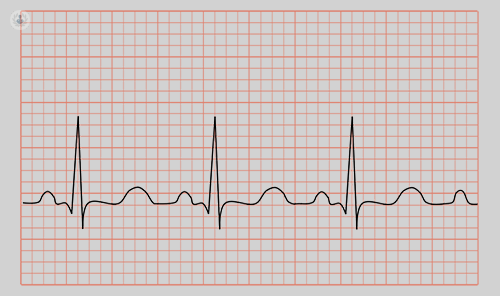


What is arrhythmia?
An arrhythmia is also known as a heart rhythm problem, causing the heart to either beat too fast (tachycardia), too slow (bradycardia) or that it has an irregular pattern. This results when the electrical pulses that coordinate the heartbeats do not work properly.

What are the symptoms of arrhythmia?
People with an arrhythmia may not experience any symptoms, but a prominent arrhythmia may result in the following symptoms:
- Chest pain
- Dizziness and vertigo
- Fainting (syncope)
- Paleness
- Difficulty breathing
- Sweating
- A slow heart beat
- A fast heart beat
What causes arrhythmia?
Arrhythmias are caused by problems in the electrical conduction system of the heart. Among the main causes are:
- Abnormal levels of potassium or other substances in the body
- Heart attack or damage to the myocardium from a heart attack in the past
- Hyperthyroidism
- Heart failure or enlargement of the heart
- Congenital heart disease
- High blood pressure
- Smoking
- Too much caffeine or alcohol
- Stress
- Diabetes
- Genetic causes
- Recreational drug use
Can arrhythmia be prevented?
There are certain risk factors that can increase the chances of developing an arrhythmia, detailed above, so the following measures can help to reduce this risk:
- Smoking cessation
- Limited consumption of alcohol and caffeine
- Proper management of diabetes
- Balancing your electrolyte levels (sodium, potassium, calcium and magnesium).
- Reducing high cholesterol levels
- Eating a healthy diet
- Exercising regularly
What is the treatment for arrhythmia?
Mild arrhythmias often won’t require treatment, but when an arrhythmia is serious treatment will be required. Treatment can consist of:
- Medication – to control the heart beat better
- Pacemaker – to help the heart to beat at a regular pace
- ICD – similar to a pacemaker, this device monitors heart rhythm, and uses small shocks to maintain a normal rhythm
- Catheter ablation – minimally-invasive procedure that destroys diseases tissue in the heart causing the arrhythmia
- Cardioversion – electric shocks are used to return the heart beat to a normal rhythm